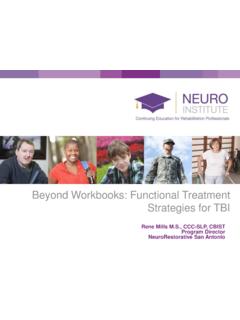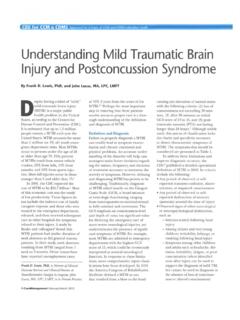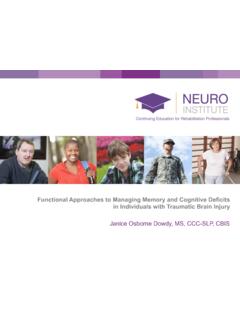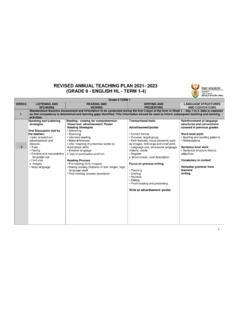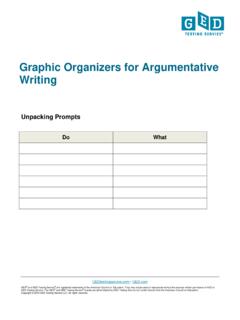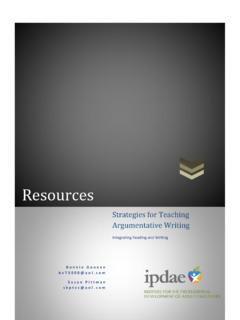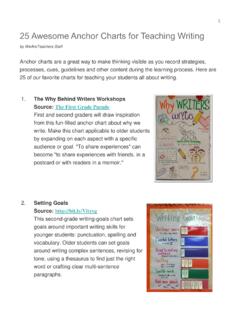Transcription of Beyond Workbooks: Functional Treatment Strategies for TBI
1 Rene Mills , CCC-SLP, CBIST Program Director NeuroRestorative San Antonio Beyond Workbooks: Functional Treatment Strategies for TBI Brief review of brain injury basics Rancho Levels of Cognitive Function-Revised Cognitive Processes Targeted in TBI Limitations of reliance on workbooks and drill activities Developing Functional Tasks Grading of therapeutic tasks Budget-Minded Therapy Ideas Question and answers Course Outline At the end of this presentation, you will be able to: utilize the Rancho Levels of Cognitive Function to develop appropriate therapeutic activities for patients with TBI.
2 Identify at least two limitations of relying solely on workbook activities and pen and paper tasks to address cognitive dysfunction in the TBI population. state the importance of utilizing Strategies to increase awareness/insight in patients with TBI. Learning Objectives Falls Motor vehicle accidents (ATV, motorcycle) Assaults Gunshot wounds Blast injuries during wartime Any event which causes a sudden impact of the brain against the skull can cause TBI. Causes of TBI response response response , agitated, inappropriate , inappropriate, non-agitated , appropriate VII.
3 Automatic appropriate VIII. Purposeful and appropriate-SBA IX. Purposeful and appropriate-SBA on request X. Purposeful, appropriate, Modified Independent Hagen, C. (1997) Revised Rancho Levels of Cognitive Functioning When Do We Start Therapy? Confused, agitated, inappropriate May have hallucinatory states Post-traumatic amnesia (absent short-term memory) Alert and heightened state of activity May exhibit aggressive behavior Verbalizations may be incoherent or inappropriate Level IV Confused, inappropriate, non-agitated May wander randomly or with a vague intent of going home Not oriented to person, place, or time Can converse on a social, automatic level for brief periods Severely impaired recent memory, confusion of past and present Unable to learn new information Level V Confused, appropriate Inconsistently oriented to person.
4 Time and place Attends to highly familiar tasks in non-distracting environment for 30 minutes with moderate redirection Remote recall better than recent recall Unaware of deficits and safety risks Consistently follows simple directives Level VI Automatic appropriate Consistently oriented to person and place. Moderate assist for orientation to time Demonstrates carry-over of new learning Unable to think about consequences of decisions or actions Unaware of other s needs and feelings Unable to recognize inappropriate social interaction behavior Level VII Purposeful, Appropriate, Stand-by assistance Independently attends to and completes familiar tasks for 1 hour in distracting environments Uses assistive memory devices with SBA May be argumentative , self-centered.
5 Have low frustration tolerance Thinks about consequences of a decision or action Level VIII Stand-By Assistance on Request and Modified Independent, respectively Can manage multiple tasks simultaneously Social interaction consistently appropriate Independently initiates daily tasks and thinks about consequences of actions, but may need extra time Low frustration and irritability when stressed, sick, or fatigued Levels IX and X Focused: Ability to attend to a stimulus. Sustained: Also known as vigilance.
6 Ability to maintain attention to a task. Most commonly addressed in therapy sessions. Foundation for other attentional processes. Selective: Ability to screen out unimportant or irrelevant information (listening to this seminar while children watching TV in other room). Alternating: Alternately doing two things that have different cognitive requirements ( : researching topic online, preparing slides for PowerPoint presentation). Divided: Responding to multiple stimuli simultaneously (cooking dinner while talking on the phone).
7 Attentional Processes Hierarchy Underlying factors contributing to inattention or decreased concentration need to be considered: Medications Poor sleep patterns Sensory impairments (diplopia, visual field cuts, dizziness, hearing loss) Pain Depression Underlying Factors Working Memory Long-term Memory Declarative Non-declarative Memory Includes all cognitive processes that are responsible for purposeful and goal-directed behavior Executive Function An example of executive function Planning Initiating Self-monitoring and self-evaluation Organization Anticipation Judgment Components of Executive Function Anticipatory Awareness.
8 Patient is able to anticipate when an impairment will affect performance and implement Strategies . Emergent Awareness: Patient recognizes when an impairment affects their ability as it occurs. Intellectual Awareness: Patient may be aware a problem has occurred, but is unable to identify it. Crosson et al. (1989). Insight and Unawareness Videotape patient while engaged in tasks, replay and have him rate performance Role-play with other patients in a group Have patient estimate performance before a task, then review after task completion Rating Scales Strategies for Lack of Insight/Unawareness Before task: How difficult will this be?
9 Will I need to use any Strategies ? What Strategies should I use? What problems might come up? After task: How difficult was this for me? How accurate was I? How much help did I need? What could I do differently next time? Patient Self-Evaluation Suitcase with mixed clothes and scenario Grocery shelves and coupons Pipe Tree Assembly City Bus Schedule Mailbox sort Ability to access internet/email Automated phone system Cognitive Obstacle Course A little cerebral humor Workbooks Workbook sheets do not improve carryover to real life settings Therapist cannot grade task to level of client Task may be over-structured.
10 Thereby minimizing attentional and executive function deficits Limitations The therapy task is NOT the most important part of the therapy session Therapy tasks should be considered only the medium for addressing cognitive deficits Rote drills have not been found to be effective in carryover to everyday life Pre- teaching sets up expectations for the patient and gives relevance of the task to their life Points to Remember Types and number of cues given (written, verbal, gestural) Level of distractions included (radio or TV on, therapy room door open) Novel task vs.
